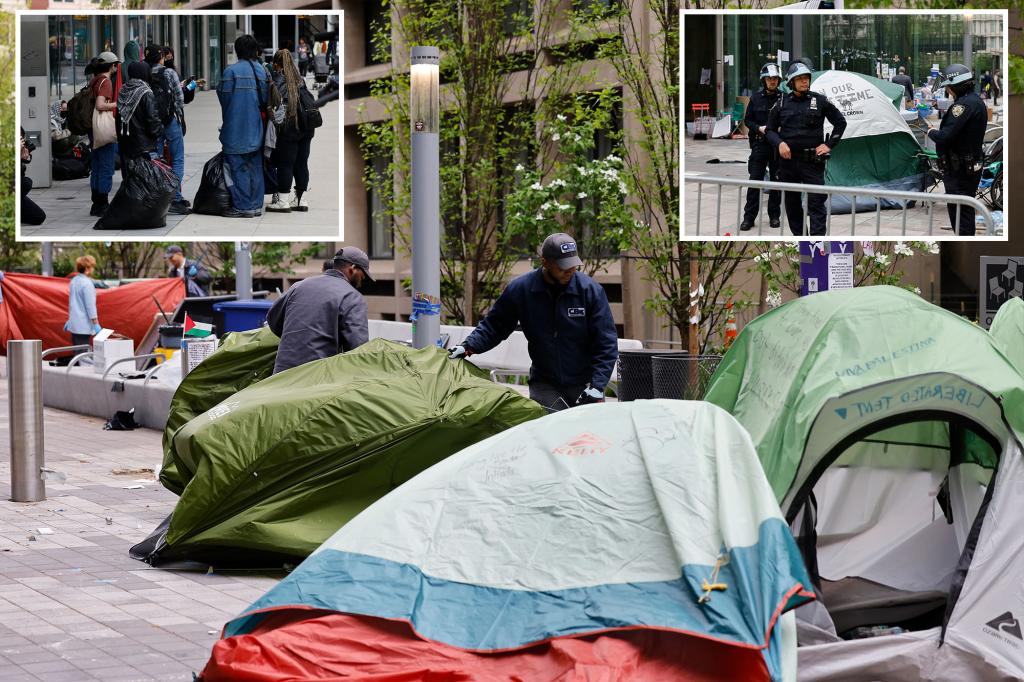The NYPD cleared out anti-Israel tent encampments at New York University and The New School at the request of college officials, leading to the arrest of more than a dozen protesters. Police officers detained 13 protesters as they dispersed the encampment on the lower Manhattan campus. Additionally, officers started dismantling other encampments at The New School and Parsons, resulting in 43 people arrested at The New School campus. The tent encampment at NYU had been up since April 26, prompting action from law enforcement.
Police officers in riot gear helmets were seen standing guard outside every NYU entrance as they worked to take down the encampment and remove protesters, closing the campus in the process. NYU’s decision to involve the NYPD came shortly after an officer accidentally fired their gun during a raid on Hamilton Hall at Columbia University. The NYPD was required to clear out the academic building after anti-Israel protesters illegally occupied it and refused to leave despite administration orders. Around 300 people, including students and non-students, were arrested during protests at Columbia and City College on Tuesday night.
The actions taken by the NYPD were in response to ongoing protests and encampments against Israel on various college campuses, including NYU, The New School, and Parsons. Video footage showed the police working to dismantle the encampments, arrest protesters, and restore order on the campuses. The involvement of officers in riot gear and the closure of NYU’s campus indicated the seriousness of the situation and the need to maintain safety and order amid the protests. The incidents at the universities highlighted the tensions and conflicts surrounding discussions and protests related to Israel.
The actions of the NYPD led to the removal of protesters, the dismantling of encampments, and the reopening of NYU’s campus after the encampment had been up for several days. The situation at the universities demonstrated the challenges faced by law enforcement in managing large-scale protests and maintaining order on college campuses. The involvement of police was necessary to address the illegal occupation of buildings, the refusal to follow orders, and the potential risks to safety and security on the campuses. The incidents also raised questions about the appropriate response to protests and demonstrations on college campuses.
The incidents at NYU, The New School, and Parsons highlighted the complex and controversial nature of protests and activism within academic institutions. The actions taken by the NYPD sparked debate and discussion among students, faculty, and administrators about the role of law enforcement in responding to protests on campus. The involvement of police in clearing out encampments and arresting protesters raised concerns about freedom of speech, the right to protest, and the use of force in managing demonstrations. The incidents also underscored the importance of dialogue, communication, and conflict resolution in addressing contentious issues and promoting a safe and inclusive campus environment.
In conclusion, the events at NYU, The New School, and Parsons involving the NYPD’s intervention in clearing out anti-Israel tent encampments showcased the challenges and complexities of managing protests on college campuses. The actions taken by law enforcement were necessary to address illegal occupation, maintain order, and ensure the safety and security of all individuals on the campuses. The incidents also prompted discussions about the appropriate response to protests, freedom of speech, and the role of police in handling demonstrations. Moving forward, it will be important for colleges and universities to engage in dialogue, create spaces for peaceful expression, and work towards resolving conflicts in a productive and constructive manner.


